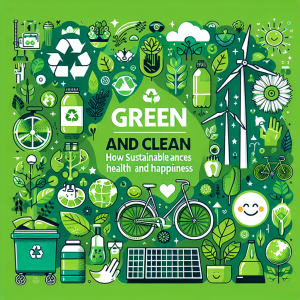Innovative eco-friendly products have become a transformative force in the market, offering sustainable alternatives that resonate with environmentally conscious consumers. These pioneering products are designed not only to minimize environmental impact but also to revolutionize how we approach everyday living, making it crucial to highlight their features, benefits, and market influence.
One of the standout innovations is the rise of biodegradable and compostable packaging. Traditional plastic packaging contributes significantly to environmental pollution; however, alternatives crafted from materials like cornstarch, mushroom mycelium, and seaweed are turning heads. These materials break down naturally, reducing landfill contributions and ocean pollution. Companies like EcoEnclose and Notpla are spearheading this movement, offering solutions that combine practicality with sustainability, appealing to both businesses and consumers eager to reduce their carbon footprint.
In the realm of personal care, eco-friendly beauty products are gaining massive popularity. Brands such as Love Beauty and Planet and Ethique are creating waves with solid shampoo bars and conditioners that eliminate plastic bottles. These products use naturally-derived, ethically sourced ingredients, ensuring a lesser impact on the planet. Additionally, they are often packaged in recycled materials, further emphasizing the brands’ commitment to sustainability. The demand for such products is driven by consumers who value not only quality but also a transparent ingredient list and eco-friendly practices.
In household cleaning, eco-friendly cleaning agents are making significant strides. Traditional cleaning products often contain harsh chemicals that can harm the environment. In contrast, brands like Seventh Generation and Method offer plant-based, biodegradable detergents and surface cleaners. These products provide effective cleaning solutions without compromising the health of users or the environment, making them appealing to eco-conscious consumers. The increasing consumer shift towards these products demonstrates a growing awareness and preference for green cleaning.
The fashion industry is also witnessing a paradigm shift with the introduction of sustainable fashion. Eco-friendly clothing brands such as Patagonia and Reformation prioritize using organic cotton, recycled polyester, and other sustainable materials. They focus on ethical manufacturing processes, including fair labor practices and reducing water consumption. This approach not only lessens environmental impact but also champions social responsibility. The rise of sustainable fashion is largely attributed to a new generation of consumers demanding transparency, ethical production, and a reduced carbon footprint from the brands they choose to support.
Renewable energy products continue to gain traction, especially in the realm of solar-powered gadgets. Products like solar phone chargers and solar-powered lights offer practical solutions while promoting green energy use. As technology advances, these products become more efficient, affordable, and accessible, encouraging broader adoption. Companies like Goal Zero and BioLite are at the forefront, developing innovative solar solutions that empower consumers to make green choices seamlessly integrated into their lives.
In the food industry, plant-based and alternative protein products are disrupting traditional markets. The shift towards diets that use less animal product is driven by an increased awareness of the environmental impact of meat production. Brands like Beyond Meat and Impossible Foods are pioneering this space with plant-based meat alternatives that taste similar to their traditional counterparts. These products cater to vegans, vegetarians, and flexitarians, emphasizing sustainability without compromising on taste or texture.
In the realm of technology, energy-efficient appliances are becoming a cornerstone of modern homes. Appliances with Energy Star certification, such as refrigerators, air conditioners, and washing machines, are designed to use less energy, saving consumers money on utility bills while reducing overall energy consumption. Companies like Samsung and LG are continuously innovating their product lines to meet the increasing demand for greener, more efficient home technology.
The transportation sector has not been left behind. Electric vehicles (EVs) are rapidly becoming a mainstream option, with brands like Tesla, Nissan, and Chevrolet leading the charge. These vehicles offer a sustainable alternative to petrol and diesel engines, significantly reducing air pollution and greenhouse gas emissions. The expanding infrastructure for EVs, such as charging stations, further supports their adoption, making electric vehicles more practical for everyday use. As battery technology improves, EVs are set to become even more integral to sustainable transportation.
Eco-friendly furniture is also captivating consumers. Brands like West Elm and Ikea offer furniture made from recycled and sustainably sourced materials. This furniture often incorporates innovative design practices that minimize waste and extend the product lifecycle. As more consumers choose sustainable living spaces, demand for eco-conscious furniture continues to rise, integrating environmental responsibility into home decor.
Finally, the influence of smart home technology cannot be overlooked. Devices like smart thermostats and energy-efficient LED lighting enhance home energy management, allowing users to optimize their energy consumption. These technologies, offered by companies like Nest and Philips Hue, enable users to control and automate energy use, further promoting a sustainable lifestyle by reducing unnecessary energy waste.
The market adoption of eco-friendly products represents a significant shift towards environmental conservation and responsible consumption. As companies explore innovative solutions and consumers demand more sustainable options, the market for eco-friendly products will likely continue to expand, driving substantial positive change for both the planet and future generations.

